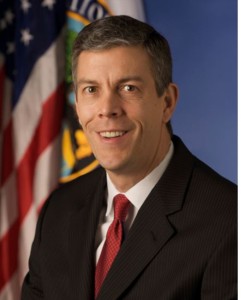States receive federal mandate for teacher equity

By Mary C. Tillotson | Watchdog.org
Effective teachers are less likely to teach low-income and minority students.
The U.S. Department of Education has asked states to submit plans — by April next year — describing how they intend to fix the situation.
Underscoring the need for some kind of solution is Vergara v. California, a lawsuit that challenged the state’s teacher job protections, claiming they were in part responsible for keeping less effective teachers in classrooms with higher numbers of low-income and minority students. Last month, the court ruled in favor of the students who sued the state.
But some are skeptical about how effective a Washington-based solution can be.
TEACHER QUALITY: U.S. Secretary of Education Arne Duncan has asked states to ensure their low-income and minority students have equal access to good teachers.
“I give the administration credit for trying to shine a light on this problem, because it’s true that low-income kids generally don’t get the most effective teachers,” said Andy Smirack, a partner at Bellwether Education Partners.
“The fundamental problem with the administration’s initiative, though … if you try to push a big program from Washington, D.C., it gets resistance in a hundred different ways. I think many people will bristle at this attempt. It looks like another D.C.-driven reform.”
Federal mandates often fail to consider the resources required to fulfill those mandates, said Lindsey Burke, Will Skillman fellow at the Heritage Foundation.
“We’ve seen what ultimately happens when the federal government tries becoming increasingly involved in the issues of teacher quality,” she said. “No Child Left Behind is a great example of that. It has a ‘highly qualified teacher’ provision in it that has resulted in tremendous paperwork burden for school districts and individuals who would like to find their way into the classroom but have to go through more expensive certification processes, which could end up deterring them from pursuing a teaching career.”
State education agencies must “describe the steps it will take to ensure that ‘poor and minority children are not taught at higher rates than other children by inexperienced, unqualified, or out-of-field teachers’” according to the letter they received Monday from U.S. Secretary of Education Arne Duncan.
The National Education Association, the country’s largest teachers union, released a statement in support of the plan. Attributed to NEA President Dennis Van Roekel, the statement lamented the number of poor and minority students who are taught by “teachers who are uncertified … teachers teaching outside their areas of certification or teachers who are not nationally board certified.”
“Our students with the highest needs deserve more,” the statement read. “Yet the current federal law offers a big loophole that calls individuals still in teacher training as ‘highly qualified.’”
While teacher evaluations remain a debated topic among those interested in education, most on-paper certifications do very little to indicate teacher effectiveness, said Sandi Jacobs, vice president for the National Council on Teacher Quality.
“Most research has shown that masters degrees are not a good measure at all. They don’t correlate with teacher effectiveness at all. Most (research) shows that certification doesn’t really matter much,” she said.
Instead, factors such as measures of student growth and classroom observations should be considered, she said, and those designing evaluation systems should be fair. Classroom observations, for example, should not focus on room temperature or the angle at which the Venetian blinds hang. Both have been factors in some teacher evaluations, she said.
“Some things that have happened early on are hard to say result in good practice,” she said.
Most teachers do not want to be evaluated solely on test scores, said Alix Freeze, senior director of communications and advocacy for the Association of American Educators, but 80 percent of teachers surveyed by AAE support using value-added assessments as part of an evaluation.
A majority of AAE’s teachers — almost 80 percent — said teachers should be paid more to teach in high-needs schools.
“We need to look at how we incentivize our best teachers, not just to want to work in high-needs schools, but to want to stay there,” Jacobs said. “There’s a sense that working in a high-needs school is a punishment rather than a reward. We want teachers to see that working with the kids who need you most should be seen as the highest accolade that we give our most talented teachers.”
“The teacher who gets the honors course is looked at as a reward, and the teacher who gets the remedial course, that is looked at differently,” she said. “We need to turn that on its head.”
NEA did not return calls for comment.
Contact Mary C. Tillotson at mtillotson@watchdog.org.







